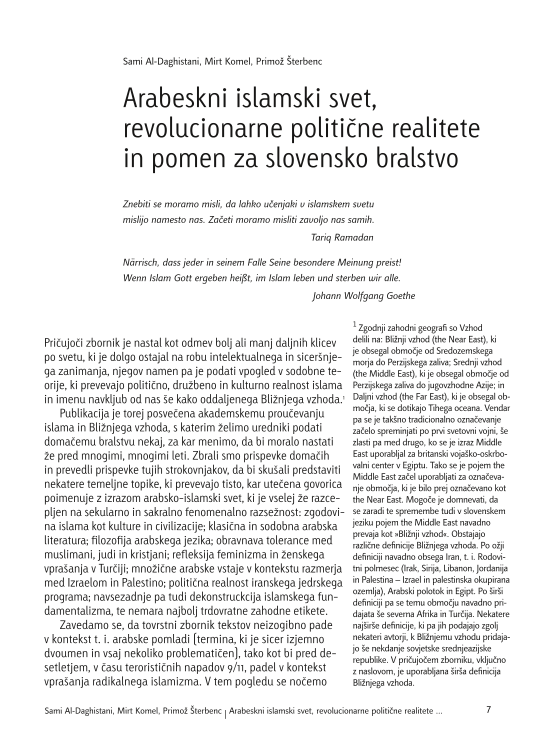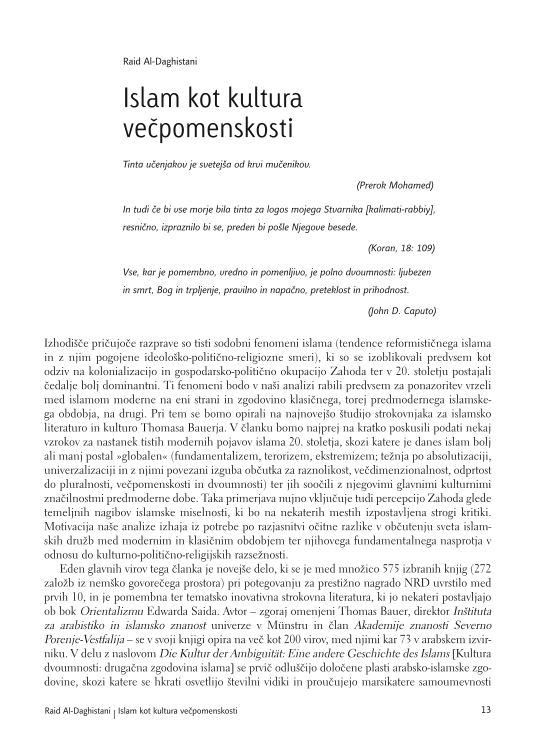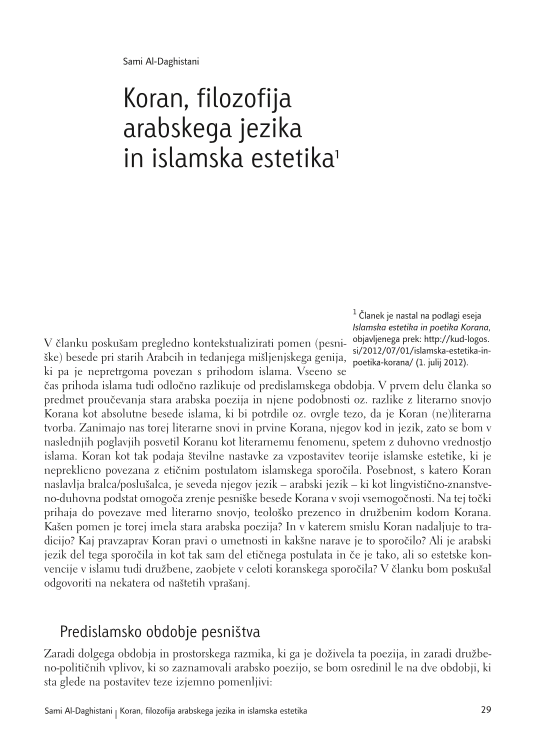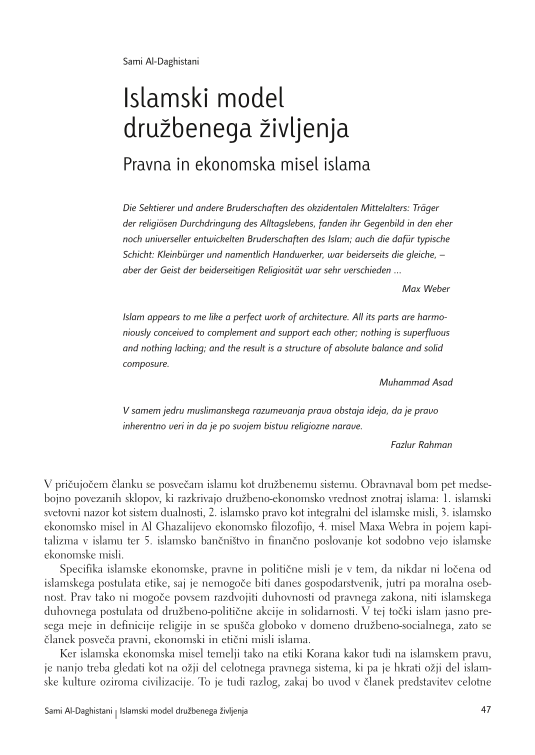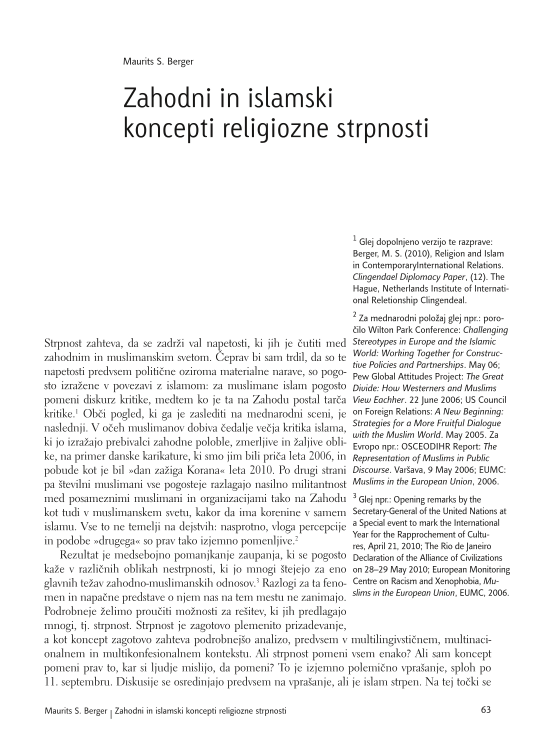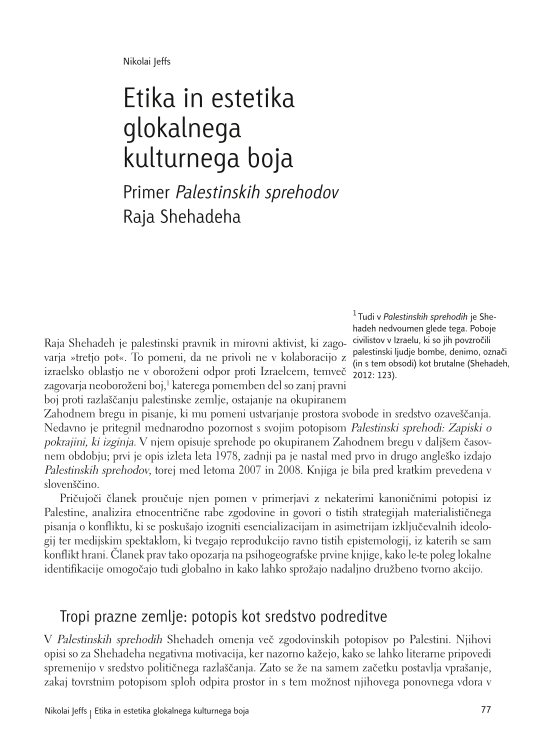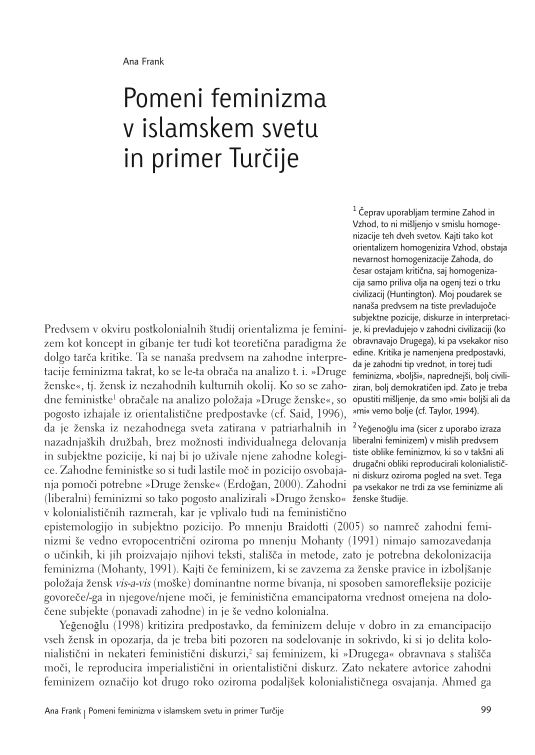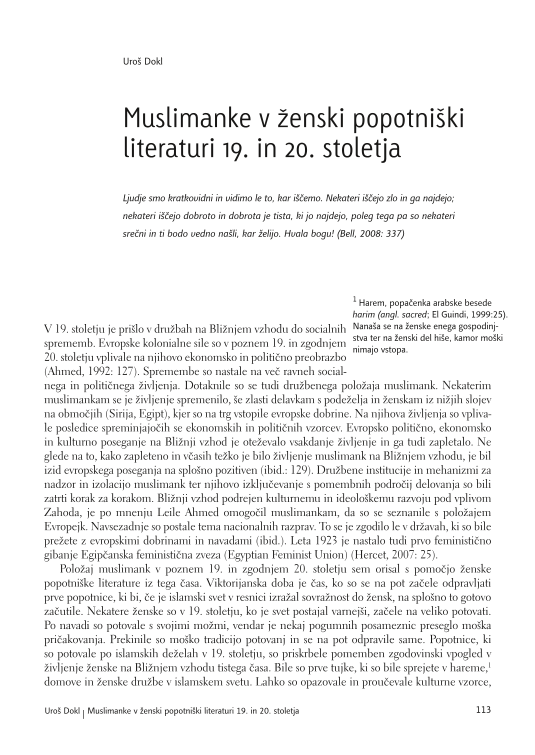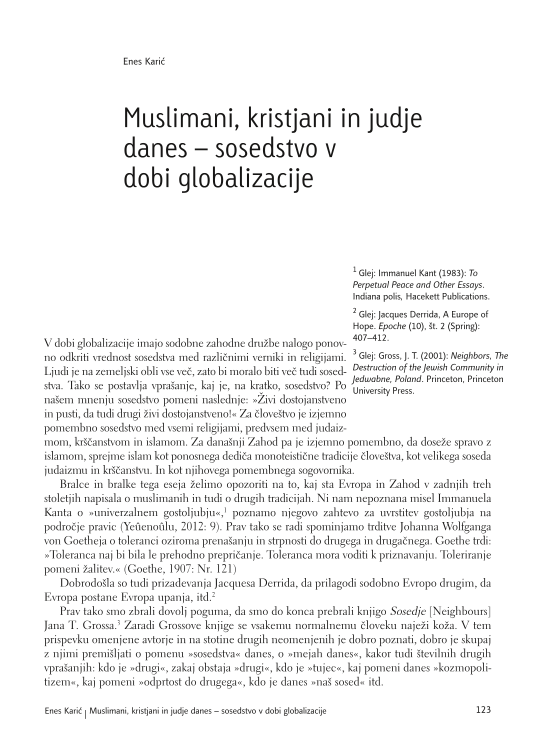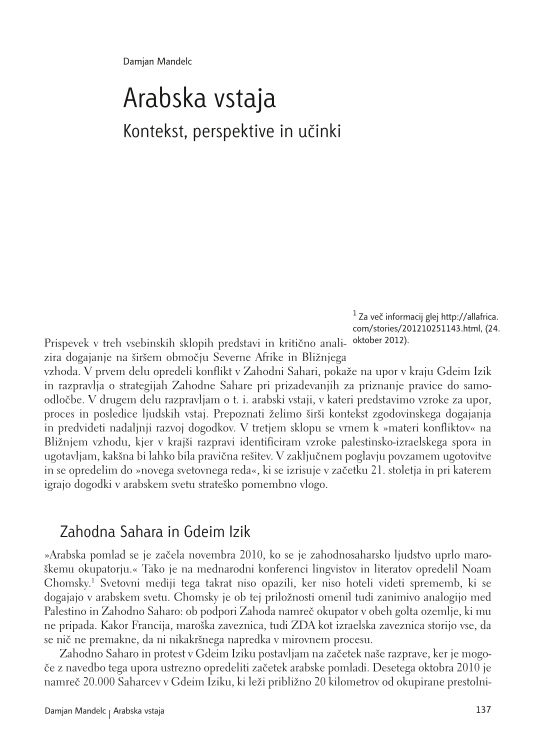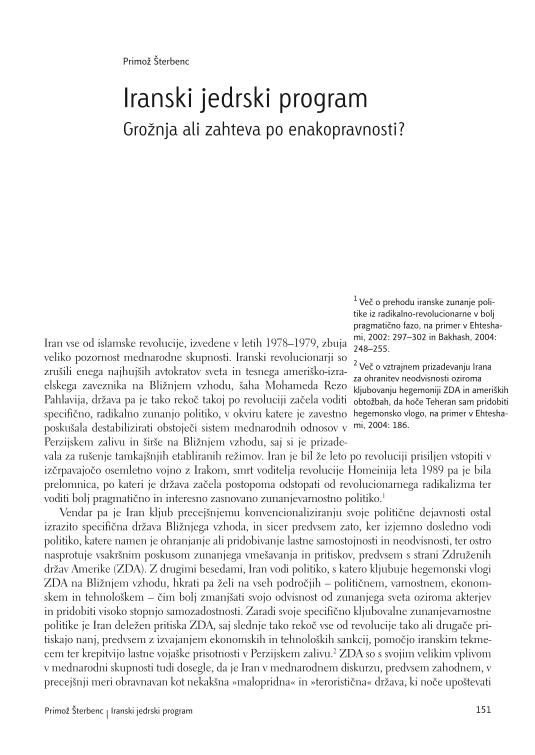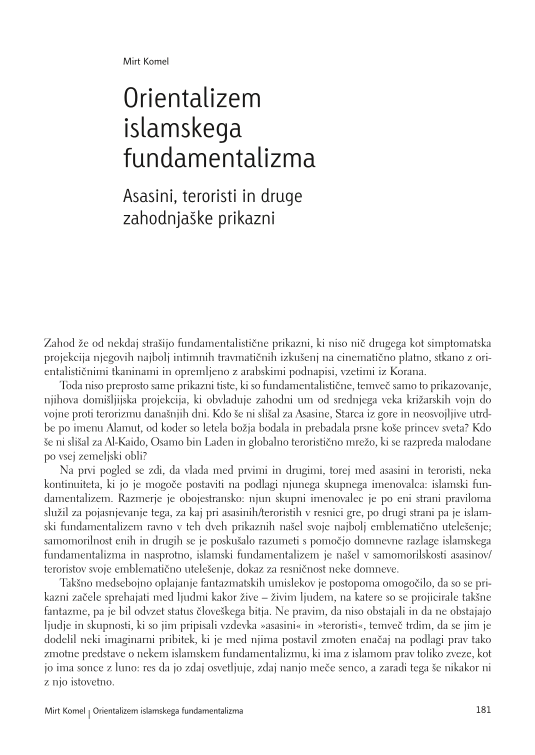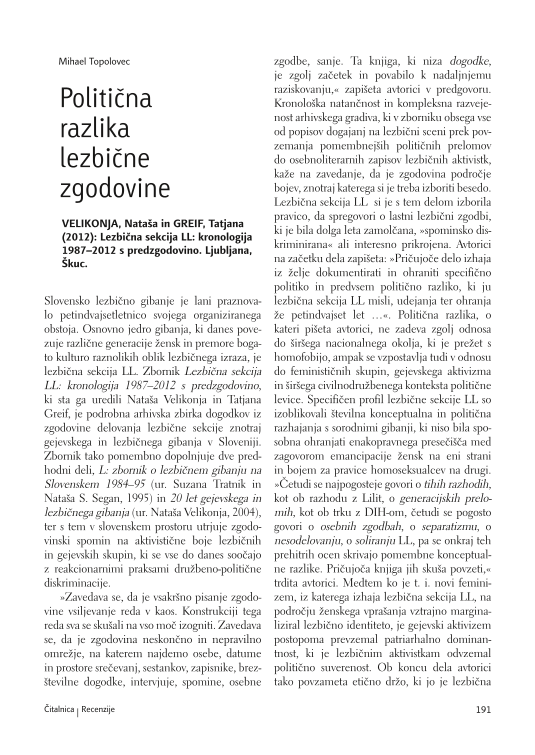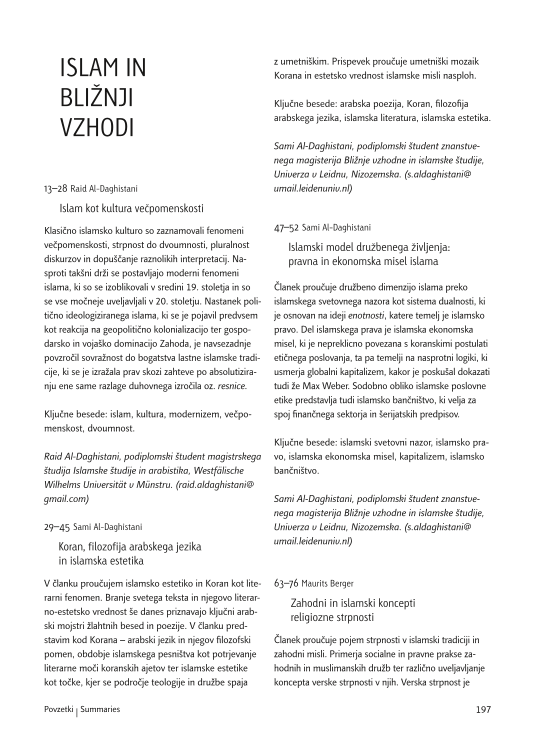Pričujoči zbornik je nastal kot odmev bolj ali manj daljnih klicev po svetu, ki je dolgo ostajal na robu intelektualnega in siceršnjega zanimanja, njegov namen pa je podati vpogled v sodobne teorije, ki prevevajo politično, družbeno in kulturno realnost islama in imenu navkljub od nas še kako oddaljenega Bližnjega vzhoda.
Publikacija je torej posvečena akademskemu proučevanju islama in Bližnjega vzhoda, s katerim želimo uredniki podati domačemu bralstvu nekaj, za kar menimo, da bi moralo nastati že pred mnogimi, mnogimi leti. Zbrali smo prispevke domačih in prevedli prispevke tujih strokovnjakov, da bi skušali predstaviti nekatere temeljne topike, ki prevevajo tisto, kar utečena govorica poimenuje z izrazom arabsko-islamski svet, ki je vselej že razcepljen na sekularno in sakralno fenomenalno razsežnost: zgodovina islama kot kulture in civilizacije; klasična in sodobna arabska literatura; filozofija arabskega jezika; obravnava tolerance med muslimani, judi in kristjani; refleksija feminizma in ženskega vprašanja v Turčiji; množične arabske vstaje v kontekstu razmerja med Izraelom in Palestino; politična realnost iranskega jedrskega programa; navsezadnje pa tudi dekonstruckcija islamskega fundamentalizma, te nemara najbolj trdovratne zahodne etikete.
Classical Islamic culture was characterised by phenomena of equivocation, tolerance of ambiguity, plurality of discourses, and acceptance of different interpretations. Contrary to this stance, various modern Islamic attitudes formed during the 19th century and entrenched during the 20th century are set. The emergence of politico-ideological Islam, which appeared foremost as a reaction to the geopolitical colonization and economic– military domination by the West, induced hatred of the rich Islamic tradition, which was exactly expressed by the suspension of a demand for an absolute single interpretation of spiritual tradition or Truth.
The article deals with Islamic aesthetics and the notion of the Qur’an as a literary phenomenon. Even nowadays, reading the sacred text and considering its literary and aesthetic value is reckoned to be essential by the key Arabic poets and theologians. The article addresses the code of the Qur’an – the Arabic language and its philosophical meaning, the period of Islamic poetry as a confirmation of the literary might of Qur’anic verses, as well as Islamic aesthetics as a point where the fields of theology and society bind with the artistic. The article focuses on the artistic mosaic of the Qur’an and the aesthetic value of Islamic thought in general.
In the article I assert the societal dimension of Islam based on the duality of an Islamic worldview, based on the notion of tewhid, whose foundation is in Islamic law. One component of Islamic law is Islamic economic thought, irrevocably bounded within the Qu’ranic postulates of ethical conduct, founded on a logic contrary to global capitalism, as Max Weber also pointed out. Islamic banking is an expression of contemporary Islamic business ethics, regarded as a conjunction of the financial sector and shari'a-based principles.
The article analyses the notion of tolerance within Islamic tradition and Western thought. I will compare the social and legal practices of Western and Muslim societies, as well as their different application of the concept of religious freedom. Religious tolerance has the same meaning in both contexts, but is applied quite differently. This difference may very well pose an obstacle when tolerance is suggested as a solution for the mistrust and misconceptions between the two sides.
The Ethics and Aesthetics of Glocal Cultural Struggle: the Example of Raja Shehadeh’s Palestinian Walks
(
This article first explores how Palestinian Walks: Notes on a Vanishing Lanscape overturns some of the conceptions of canonical works of travel writing on Palestine, especially the trope of the »empty land«. After this it draws attention to how the narrative avoids the asymmetry of exclusionary ideology and what kind of more materialistic strategies in the representation of Palestinians and Jews it deploys and so as to avoid the reproduction of precisely that epistemology that also motivates the Israeli-Palestine conflict. Some of the psychogeographical elements of the book are also mentioned and the ways in which these, despite being local, nonetheless allow for global identification and socially productive action. This is analysed through the concepts of the »decompression of time and space« and »glass doors«. In addition, Palestine Walks can also be read as an answer to dominant anglophone media images of Israel/Palestine.
The article focuses on different meanings of feminism and feminist (op)position, with special attention on understanding feminism in the Islamic world, especially in Turkey. Feminism is an open concept, which has no fixed meaning and form, but is always re-defined according to the context within which different subjects employ it. Feminism in these contexts is not just a privileged position of the West, which claims the right to define feminist demands in its own terms according to specific and particular norms and values. Indeed, feminism is always contextualised and re-interpreted according to specific needs and (op)position of women.
In this article I examine the position of women in Islam, from the beginning of the 19th century till the end of the Second World War, through the eyes of female travel writers. The first women travellers who set out for the Middle East were the first outsiders to be accepted into women’s societies in the Islamic world, and thus they entered the life behind the veil. Comparing writers’ encounters with Muslim women and the Muslim world in general, I describe Muslim women throughout various stages of life.
Humankind is diverse, and religious humankind especially so. Different languages, faiths, customs, views, thoughts and opinions are all to be considered when one wants to talk about neighbourhood and neighbourliness today. Indeed, what do neighbourhood and neighbourliness mean, and what it means to live in neighbourhood with others in the period labelled as globalization? My paper discusses the modern day affirmation of the idea of neighbourhood among Muslims, Christians and Jews. I consider that task most important, since symbols, ideas, and religious representations of Muslims, Christians and Jews have been somehow a part of neighbourhood and neighbourliness for a very long time. How can we preserve a neighbourhood and neighbourliness? How can we extract a neighbourhood of human lives and fates from a neighbourhood of symbols, representations and ideas? This paper will try to give answers to these questions.
In this article we discuss three interrelated topics, framed within discourses of individual and collective human rights, right of self-determination, democratic processes, people`s uprisings, and geopolitical (im) balances. First, we are interested in the situation of Western Sahara and the 37 years of ongoing Moroccan occupation; we refer to this country as Africa’s last colony. Discussion leads us to reflection of the political strategies of Sahrawis to achieve their national liberation, one of them being Gdeim Izik camp, understood by some relevant authors as the beginning of the »Arab spring«. The »Arab spring« is the second focus of our discussion. We offer a timetable and stress the context of events from the Western Sahara attempt in Gdeim Izik, popular uprisings in Tunisia, Egypt and Yemen that ended in the resignations of their leaders and governments, civil wars in Syria and Libya, to bigger and smaller protests and their consequences in Oman, Kuwait, Bahrain, Jordan, Morocco, Mauretania, Algeria, Sudan, Saudi Arabia, Iraq, Lebanon and Djibouti. We try to offer a deconstruction and reconstruction of the »Arab spring«. In the third part, we discuss the Israeli/Palestinian conflict and the perspectives for solution. The conclusion reflects on the strategic, social and political implications of the »Arab spring«, the role and response of the international community, and the new global wave of resistance against political and financial elites.
Ever since 2002 relations between the West and Israel on the one hand and Iran on the other have been deteriorating due to the contentious issue of Iranian nuclear programme. Israel and the US have been claiming that there has been a secret Iranian nuclear weapons program, on the grounds that Iran has persisted in its effort to acquire independent uranium enrichment capability and has since 2006 allowed only limited inspections by the International Atomic Energy Agency. Iran has been claiming that its nuclear program is entirely peaceful. Today, one certainly cannot exclude possibility of a military attack on Iranian nuclear facilities. However, one cannot properly understand the problem without taking into account the historical and structural dimensions. Namely, Iran's nuclear policy has been guided by country's determination that it will become independent and self-reliant in every possible field – a result of its very negative historical experience. Thus, Iran has been determined to fully exercise its right to peaceful nuclear development, to which it is entitled according to the Treaty on the Non-Proliferation of Nuclear Weapons. Iran has been striving to overcome the structural dependence of developing countries in the field of nuclear energy, as they have been denied the possibility of comprehensive nuclear development for peaceful purposes by countries possessing developed nuclear industries. The latter have prevented balanced implementation of the Treaty on the Non-Proliferation of Nuclear Weapons.
Orientalism of Islamic Fundamentalism: Assassins, Terrorists and other Western Phantoms
(
The article tries to deconstruct the orientalist construction of Islamic fundamentalism, especially those discourses and images that are specifically related to the question of violence originally found in the mythologies of the alleged forerunners of modern terrorism, the so-called »Assassins«, mythologies still in circulation today.
VELIKONJA, Nataša in GREIF, Tatjana (2012): Lezbična sekcija LL: kronologija 1987–2012 s predzgodovino. Ljubljana, Škuc.
Slovensko lezbično gibanje je lani praznovalo petindvajsetletnico svojega organiziranega obstoja. Osnovno jedro gibanja, ki danes povezuje različne generacije žensk in premore bogato kulturo raznolikih oblik lezbičnega izraza, je lezbična sekcija LL. Zbornik Lezbična sekcija LL: kronologija 1987–2012 s predzgodovino, ki sta ga uredili Nataša Velikonja in Tatjana Greif, je podrobna arhivska zbirka dogodkov iz zgodovine delovanja lezbične sekcije znotraj gejevskega in lezbičnega gibanja v Sloveniji. Zbornik tako pomembno dopolnjuje dve predhodni deli, L: zbornik o lezbičnem gibanju na Slovenskem 1984–95 (ur. Suzana Tratnik in Nataša S. Segan, 1995) in 20 let gejevskega in lezbičnega gibanja (ur. Nataša Velikonja, 2004), ter s tem v slovenskem prostoru utrjuje zgodovinski spomin na aktivistične boje lezbičnih in gejevskih skupin, ki se vse do danes soočajo z reakcionarnimi praksami družbeno-politične diskriminacije.




